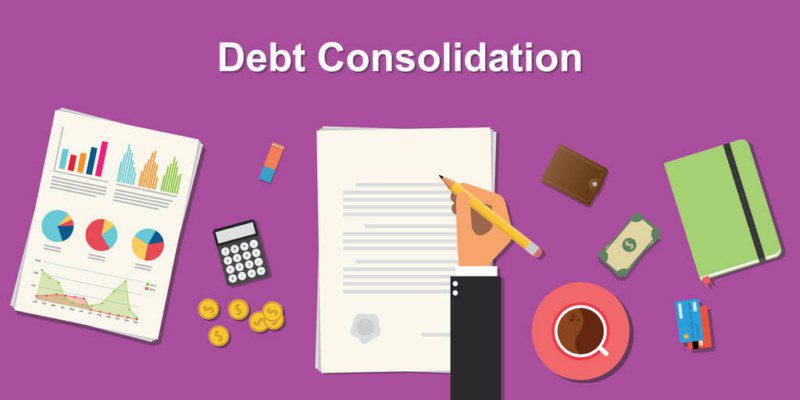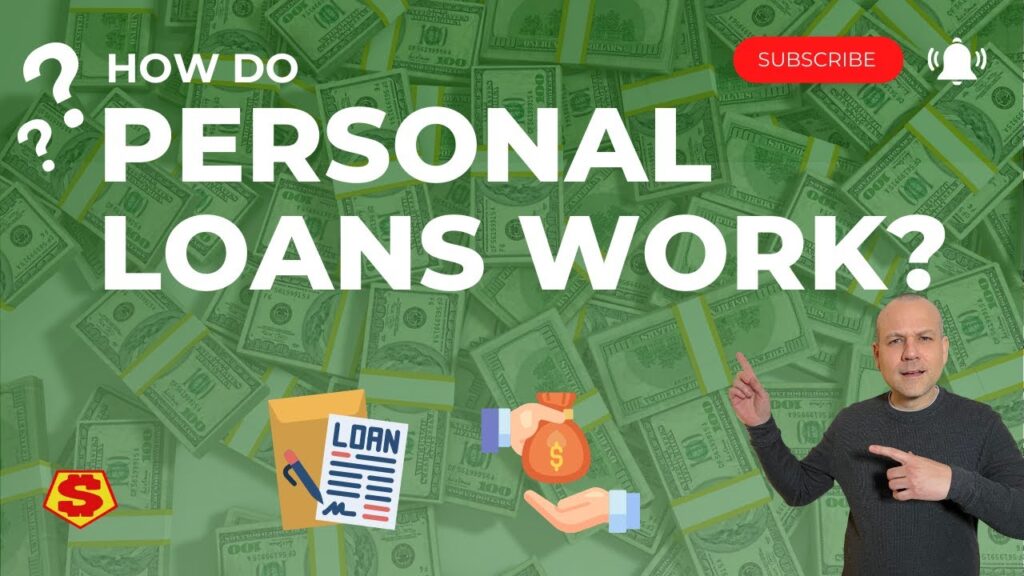Taking out a debt consolidation loan can provide much-needed financial relief for borrowers struggling with mounting payments across multiple high-interest credit cards, loans, and lines of credit. These singled-out borrowers grapple with depleted income streams failing to cover swelling monthly minimums falling due. Debt consolidation products allow consumers to bundle debts under a singular newly originated loan at a lower interest, aiming to lift burdens through structured repayment over longer terms.
Borrowers frustrated by perpetual late fees, penalty rates, and credit damage from missed payments can reset timelines with debt consolidation. By enrolling varying credit products into one refinanced loan, borrowers also simplify stayed efforts toward eventually exiting debt. Further benefits include lower monthly outlays through secured reduced rates, regained revolving credit freedom as old accounts get paid off in consolidation, boosted credit utilization, and long-run savings from interest decreases.
However, debt consolidations demand reasonable certainty of income flows covering the fresh required installment. For borrowers still struggling with cash deficits unable to be fixed by interest savings, consolidation loans may fail to resolve underground issues, prolonging debt persistence. Evaluating affordability alongside refinancing appeals remains imperative before pursuing an application.

Comparing Debt Consolidation Lenders
The debt consolidation loans marketplace stands as diverse as the financial situations of individual borrowers themselves. Traditional banks, credit unions, peer-to-peer lending marketplaces, payday lenders, and other specialty finance companies all hawk some formulation of debt consolidation service. Comparing options through dimensions of qualification ease, interest rate competitiveness, and hidden fee transparency becomes paramount for locating the right match.
Debt consolidation lenders anchor products to either secured or unsecured structures. Secured loans running through bank lenders often carry lower interest rates by tying eligibility to a pledged asset like auto, securities portfolio, or real estate equity as loan guarantee. This evades problematic credit histories, impairing other unsecured consolidations. But for already asset-depleted borrowers, unsecured alternatives factor more prominently.
How do I choose the best debt consolidation lender?
Finding the perfect fit amidst numerous Debt Consolidation Lenders requires a multi-pronged approach. Start by comparing interest rates and fees, prioritizing options with the lowest overall cost. Next, assess loan terms like repayment length and prepayment flexibility to ensure they align with your budget. Don’t forget to check eligibility requirements and ensure you qualify before proceeding. Finally, research customer service reputation to guarantee a smooth experience. Remember, the “best” lender is the one that best suits your unique financial needs and goals. So, compare diligently and choose wisely!
Debt Consolidation Loans from Banks and Credit Unions
Local brick-and-mortar banks draw appeal by housing all finances under one roof through familiar faces. Credit unions link even closer to individual communities. Both illustrate member priorities over pure profits. Community bank and credit union consolidation loans thus carry attractive non-profit-backed interest rates below 12%. However, smaller-scale operations limit asset resources to cut rates for riskier borrowers deeply. Opaque qualification metrics also perplex even creditworthy borrowers.
Common regional bank consolidation options like lending overdraft lines, HELOCs, and personal loans carry average APRs spanning 6.5% to 36%. Eligibility sticks to the middle FICO range with solid income verification and existing customer rapport. Joint application and cross-collateral through deposit, investment, or mortgage accounts also improve odds for those with weaker standalone profiles. Home equity loans holding residences as collateral offer the lowest interest pathway but still demand robust documented finances covering loan-to-value ratios.
Debt Consolidation Loans from Online Lenders and Marketplace Platforms
Online lenders originated through financial technology advancements that make speed, transparency, and flexible qualification constant process cornerstones, allowing customization absent from traditional underwriting. By inputting individual factors like existing obligations, credit, assets, and income into dynamic algorithms, customizable recommendations outpace locality-constrained options. Though some solely offer unsecured personal loans, other niche marketplaces enable peer-to-peer bidding from networks of verified investors proposing their own terms to applicant borrowers through consolidated listings.
Upstart, LendingClub, Prosper, BestEgg, and other emergent disruptors allow instant prequalification and competitive selections of loan offers. This facilitates choice autonomy based on factors resonating strongest with individuals, like rapid funding, no early repayment penalties, or the ability to temporarily pause installment collections given income fluctuations. While interest rates trend slightly higher than large national banks, with rates between 7% and 36%, the ability to shop personalized non-standard options furnishes consolidation opportunities for those unable to secure traditional approval.
Qualifying for the Best Debt Consolidation Loan
Qualification standards running the debt consolidation loan gamut enable reasonable access regardless of current credit standing. However, locating the absolute optimal match commands attention across critical variables covered only through exhaustive research. While subprime borrowers face rightful constraints, even candidates boasting stellar financial health sacrifice deals offer an ideal springboard toward long-term stability.
Among prime borrowers, over-focusing on absolute rate underserves larger contextual performance outcomes shaped by factors like prepayment options, bundled credit monitoring tools, and specialized payment reduction programs during transitional hardship periods like job losses. Accepting slightly higher rates on products furnishing flexibility renders a greater advantage than nominal decreases without contingent provisions that anticipate life volatility.
Prime Borrowers (Good-Excellent Credit)
Candidates entering debt consolidation already managing healthy credit epitomized by FICOs above 670 access profit-driven banks and socially focused credit unions assuming roles as prime loan stewards. Scoring above 700 unlocks exponential bidding from national money center banks like Citi, Chase, and Bank of America, anxious to court loyal customers through value-added offerings packaged alongside flagship credit card and deposit products. Interest rates routinely fall below 10%, while personalized members-only benefits introduce further leverage on the path toward long-term membership.
PenFed Credit Union offers top-tier consolidators rock-solid options claiming national attention. Boasting rates as low as 6.49% fixed across five-year terms, they couple unparalleled savings with member-elected board governance and military roots, issuing required transparency and trustworthiness associated with public servants. Applicants looking to refinance up to $20k in existing credit would find an ideal partnership through their consolidation offering if membership eligibility is proven.
Subprime Borrowers (Poor-Fair Credit)
Debt-burdened subprime borrowers coping with credit scores below 640 necessitate alternative channels, avoiding conventional requirements and scrutiny, standing as deal breakers given past financial mistakes. Still, viable options exist through specialized subprime lenders oriented to absorb higher risk while furnishing reasonable terms allowing gradual economic rehabilitation channeled through debt consolidation loans ranging between 15-30% APR.
LendingClub furnishes full loan consolidation offerings to applicants holding existing relationships without pressing minimum score requirements. They assess holistic eligibility spanning income, existing unsecured debt loads, and FICO trajectory more broadly. Minimum credit lines still apply, but those facing past isolated setbacks find refuge through their expansive approval window, expecting only timely payments in return.
Upstart further serves near-prime customers by weighting education, employment history, and borrowing purposes beyond solely credit scores when deriving custom rates. Applicants detail professional credentials and upward mobility to attenuate negative signals tied to a lack of credit history or past financial instability. Flexible terms and fixed rates topping out at 24% still trounce alternatives strangling narrow means.
Managing Your Debt Consolidation Loan and Finances
In the wake of securing the optimal debt consolidation product, shifting gears toward financial rehabilitation through shrewd budgeting and plasticity with new minimum payments activates loan efficacy. Paying mind to excess non-debt monthly spending patterns allows borrowers presidency over eliminating grounds which invoked consolidation originally – unaffordable interest accumulation across unsustainable credit lines.
Automation removes negligence risk associated with manual excess spending temptations and payment tracking. Consolidators configure autopay options on origination dates, deducting fixed installments directly from bank accounts on recurring monthly due dates. Autopay enrollment also typically earns .25-.50% interest discounts. Further, consolidators issue digital payment notifications before processing to allow proactive confirmation or editing to cater to dynamic financial schedules.
With singular manageable payment streamlined, borrowers regain flexibility by addressing longstanding spending shifts rather than relentlessly keeping afloat through unsustainable balance transferring activity. Additional available income gets redirected toward attacking principal balances or channeling into savings vehicles, transitioning borrowers gradually off debt dependence.
As installment conclusion nears, proactive credit repair initiatives also help borrowers reclaim stability. Regional credit counselors guide enrollees through tailored recommendations specific to current score damage, like dispute letters forcing corrections of inaccurate late payments. They also create low-limit, no-annual-fee products to slowly reintroduce positive credit behaviors.

How can I manage my budget with the debt consolidation loan?
To manage your budget with a debt consolidation loan, enroll in autopay, closely monitor spending habits that contributed to debt issues originally, and work with your lender like Debt Consolidation Loans to allocate freed-up income toward paying extra principal each month. A credit counselor can also help create a sustainable budget and payment strategy tailored to your situation.
Summarizing the Best Debt Consolidation Loans
The debt consolidation loan market continues evolving through emergent fintech lending channels, opening borrowing viability to those unable to secure traditional bank approvals. While subprime candidates still accept relatively higher rates and structured terms commensurate with risk levels, reasonable pathways to refinancing exist through specialized underwriting models weighing dynamic factors and focusing holistically on regaining member trustworthiness.
But all borrowers, regardless of baseline scores, can benefit through exhaustive comparative research identifying the most mutually beneficial consolidator based on clearly defined financial goals. Those with solid existing profiles ought not simply to reach for rock bottom rates at the expense of valued flexibility options holding significance over long-run repayment. Even prime members need contingency support to anticipate unexpected turmoil jeopardizing fixed roads ahead.
Approaching debt consolidation loans not just as a singular stopgap refuge but rather as a comprehensive partner along the journey to financial wellness liberates strategic selection criteria and post-funding performance. Budget automation, principal prepayment incentives, credit rehabilitation resources, and responsive customer support distinguish industry leaders who view borrowers as community members rather than segmented risk pools. A shared vision of renewed stability empowers escape.
Disclaimers: The information is for general purposes only and not financial advice. While secured loans offer lower rates, they don’t evade problematic credit histories entirely. Defaulting on a secured loan can still lead to repossession. The statement that national banks have higher average APRs than community options is not always true. Smaller banks may have higher rates due to limited resources. The 6.49% rate is only available for shorter terms (2-3 years) and requires autopay. Longer terms have higher rates.
What are the main benefits of a debt consolidation loan?
Debt consolidation loans can offer several benefits to help manage your finances:
Simplify your debt: Replace multiple monthly payments with one, potentially lower payment, streamlining your budget and reducing stress.
Potentially lower interest rates: By consolidating high-interest debt like credit cards with a lower-rate loan, you could save money on interest charges over time.
Improve your credit score: Consistent on-time payments for your consolidation loan can positively impact your credit score, making it easier to access future loans and credit at better rates.
Gain control of your finances: Debt consolidation loans can provide a clear payoff plan, helping you manage your debt more effectively and achieve financial goals faster.
Remember, debt consolidation loans aren’t a magic solution. Carefully assess your situation, consider alternatives, and ensure you can afford the monthly payments before taking on new debt.
What credit score do I need to qualify?
The credit score needed to qualify for Debt Consolidation Loans varies depending on the lender but generally falls between 620 and 720. However, it’s not just about the number. Lenders also consider factors like income, debt-to-income ratio, and employment history.
While a higher score might secure lower interest rates, don’t be discouraged if yours falls outside this range. Some lenders cater to borrowers with lower scores but expect higher interest rates. Explore options, compare rates, and consider consulting a credit counselor for personalized guidance before committing to a Debt Consolidation Loan.
Should I use a home equity loan or line of credit to consolidate?
Home equity loans or lines of credit can offer low-interest rates for consolidation but also risk your home if you default. An unsecured personal loan from lenders like Best Debt Consolidation Loans may be safer and not put your residence in jeopardy, though rates are higher. Evaluate your confidence in repaying when deciding if tapping home equity for consolidation is advisable for your situation.

